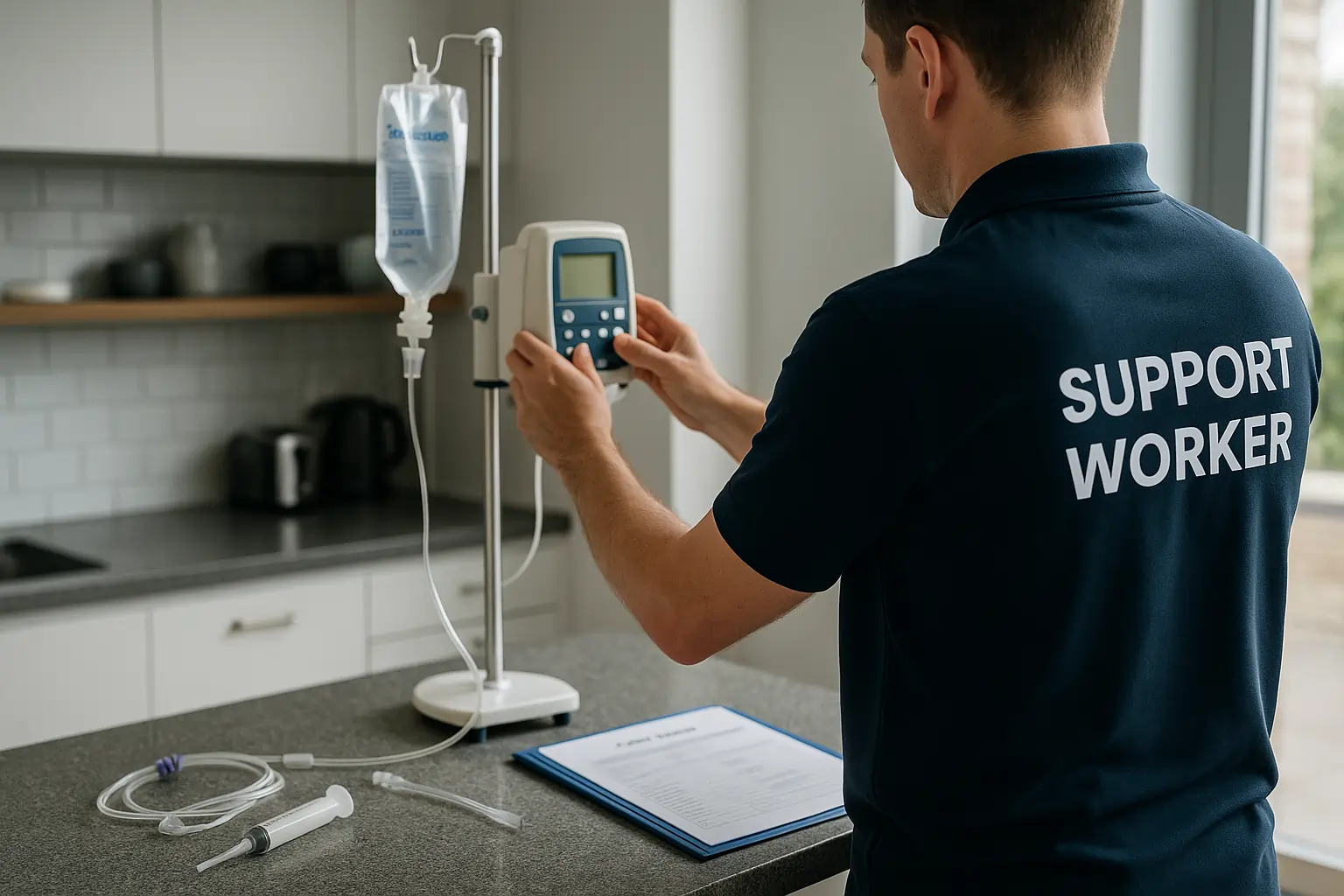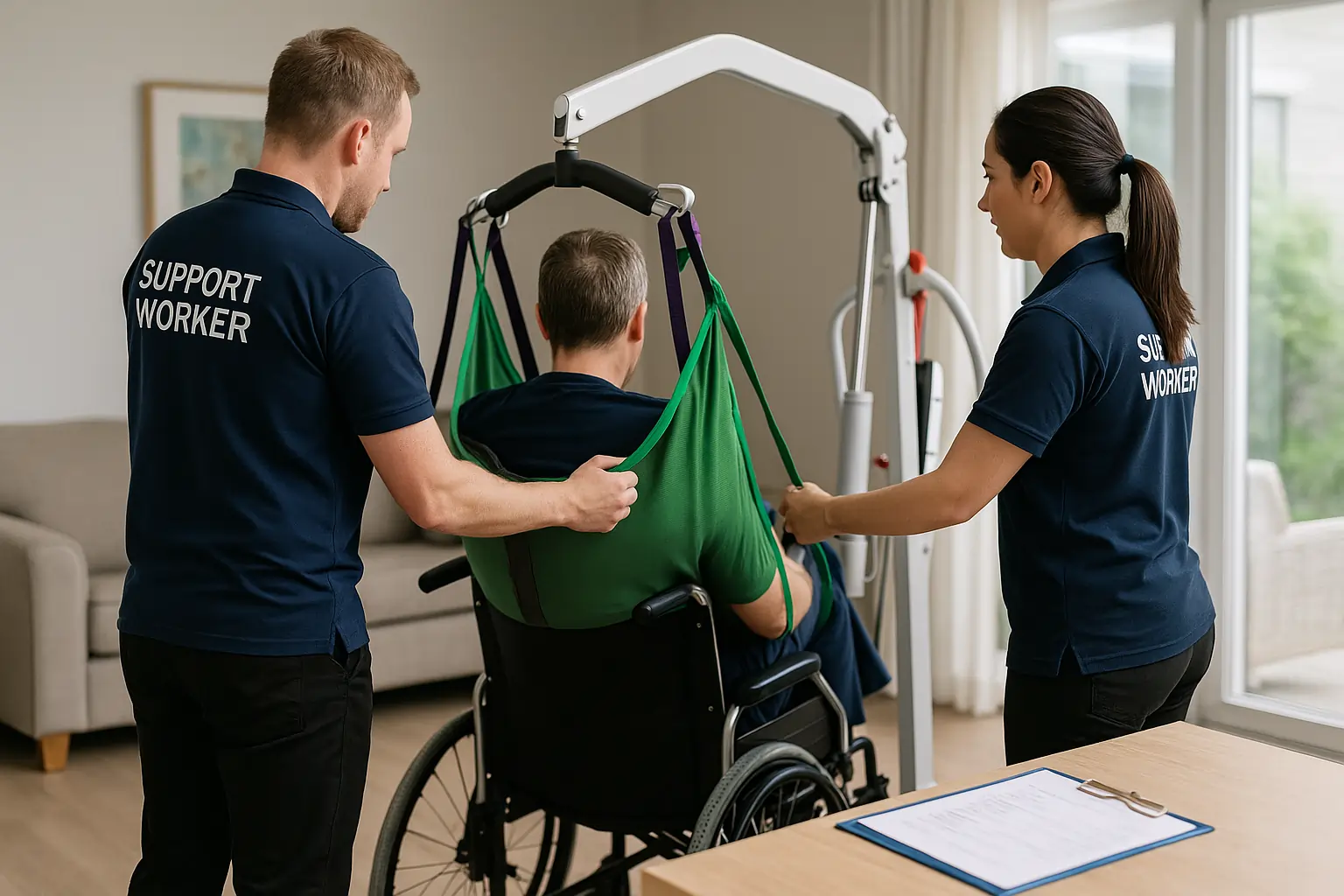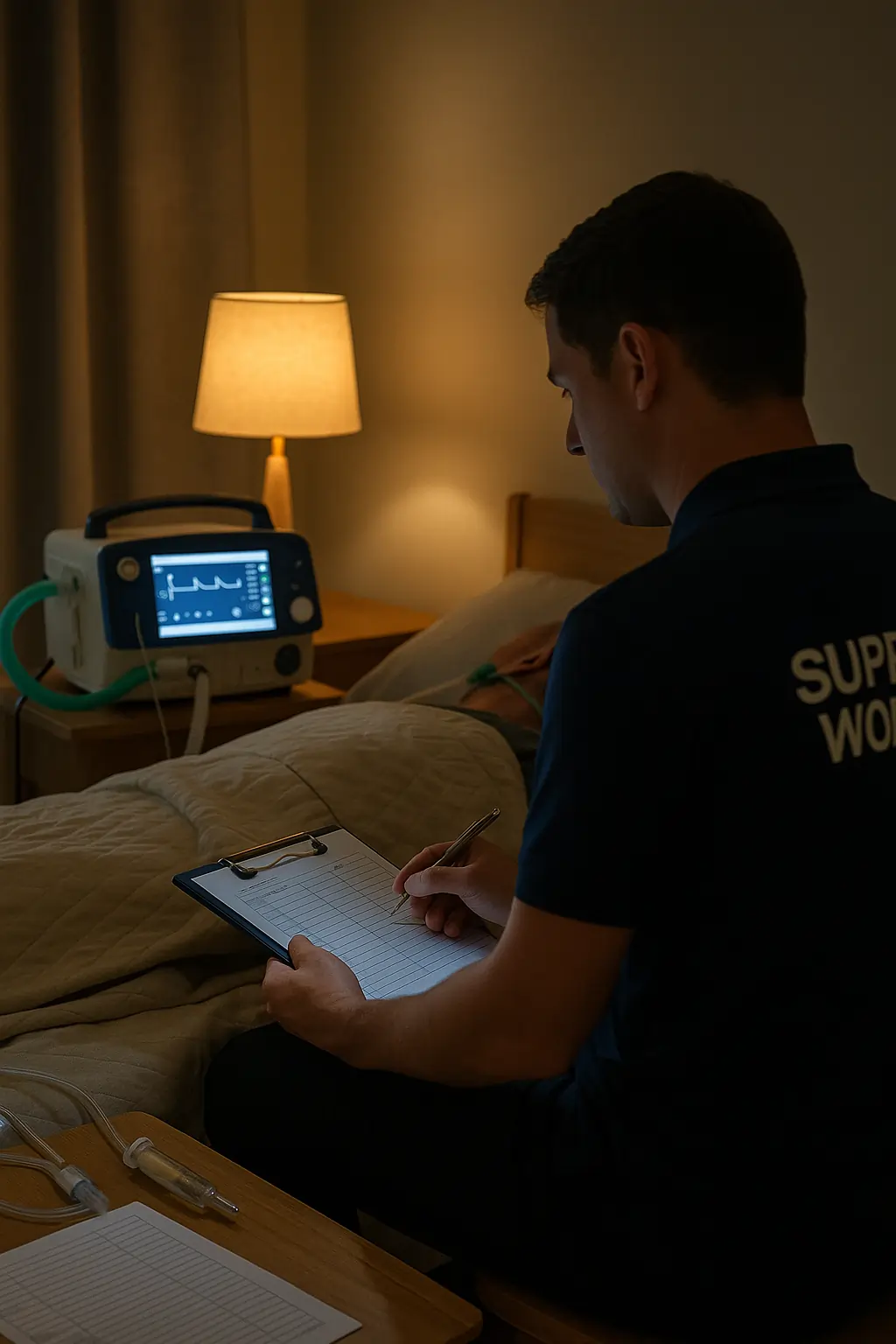Complex Care in Melbourne includes safe, reliable, high-intensity supports delivered by clinically trained staff to help you live independently at home and in the community.
The Help at Hand Support team works under clinical governance, with clear care plans, risk controls and 24/7 coverage when required.
What is Complex Care in Melbourne under the NDIS
Complex Care, under the NDIS, refers to specialised high-intensity supports delivered by trained support workers under strict clinical governance.
These supports are designed for NDIS participants who have complex health needs that require advanced care procedures with a higher level of medical risk.
Every Complex Care Melbourne plan is guided by written clinical instructions, risk assessments, medication charts, mealtime and dysphagia plans, and positive behaviour support strategies where relevant.

Who is Complex Care in Melbourne designed for
Complex Care Melbourne is designed for NDIS participants who need advanced support to safely manage complex medical conditions or high-risk behavioural needs.
It provides specialised assistance for individuals who require skilled intervention beyond standard personal care.
This includes:
- People with spinal cord injuries who rely on ventilators for breathing support
- Participants with tracheostomies or PEG/PEJ feeding requirements needing daily tube care and monitoring
- Individuals with epilepsy or seizure disorders who may require rescue medication and emergency response protocols
- People with acquired brain injuries or degenerative neurological conditions need structured high-intensity support
- Participants with advanced diabetes requiring insulin administration and regular blood glucose monitoring
- Families seeking structured respite care with clinical oversight to ensure safety and continuity of care
Every participant receives a tailored Complex Care Melbourne plan built around clinical instructions, risk assessments, and NDIS High Intensity Daily Personal Activities guidelines to maintain safety and dignity at home and in the community.

What tasks are included in Complex Care Support in Melbourne
Complex Care Melbourne offers a comprehensive range of high-intensity daily personal activities, delivered by trained staff under the guidance of clinical governance.
These tasks are considered high risk, require advanced training, and must follow strict care plans with competency sign-offs.
The key tasks covered in Complex Care Melbourne are as listed below.
- Tracheostomy support, suctioning and humidification
- Ventilator assistance and circuit monitoring
- Enteral feeding via PEG or PEJ tubes
- Bowel care, including enemas and suppositories
- Catheter care for SPC and IDC
- Seizure management with rescue medication such as midazolam
- Diabetes care with insulin injections and monitoring
Note: Each of these tasks in Complex Care Melbourne is delivered with strict risk controls, escalation procedures, and documentation to meet NDIS High Intensity Daily Personal Activities standards.

How Complex Care Support in Melbourne works
Complex Care Melbourne works through a structured process that ensures every high-intensity support is safe, consistent, and aligned with clinical requirements.
Each stage focuses on assessment, planning, delivery, and review, ensuring participants receive reliable care that meets the NDIS High Intensity Daily Personal Activities standards.
The process includes:
- Clinical intake with referral and risk screening
- Development of a personalised care plan
- Allocation of skilled support workers and nurses
- Competency training and shadow shifts
- Roster setup with redundancy and relief options
Twenty Four Hour Complex Care Melbourne
Twenty-four-hour complex Care Melbourne provides round-the-clock support for participants who require continuous monitoring and high-intensity care. Services are delivered using different roster models to match individual health needs and NDIS budgets.
The available options include:
- Active night shifts – support workers remain awake and attentive throughout the night to manage ventilators, tracheostomies, seizure protocols, or other clinical tasks.
- Sleepover shifts – a worker is present overnight and can be woken if assistance is required, suitable for participants with lower overnight risk but who still need safety reassurance.
- Split shifts or rotating rosters – multiple workers provide coverage across 24 hours, ensuring all high-intensity tasks such as PEG feeding, catheter care, or medication administration are delivered without interruption.
Each roster is customised to participant care plans, medical orders, and family preferences, with relief staff always available to cover unplanned leave or emergencies.
This approach ensures the continuity of Complex Care Melbourne supports, prevents service gaps, and gives families confidence that high-risk needs are consistently managed.

Clinical governance and safety in Complex Care Support in Melbourne
Clinical governance and safety in Complex Care Melbourne ensure all high-intensity supports are delivered with strict oversight and accountability.
Tasks such as tracheostomy care, ventilator monitoring, PEG feeding, and seizure management follow detailed care plans, risk controls, escalation pathways, and competency records.
Help at Hand Support complies with NDIS Practice Standards for High Intensity Daily Personal Activities, including incident management and restrictive practice authorisation.
Regular spot checks, audits, and post-incident reviews maintain safety, while competency sign-offs ensure staff remain skilled and compliant.

Complex Care Melbourne and hospital discharge
Complex Care Melbourne plays a vital role in ensuring safe hospital discharge by facilitating a smooth transition from hospital to home for participants.
The team at Help at Hand Support attends discharge planning meetings, coordinates with treating clinicians, prepares equipment and medication lists, and sets up rosters with trained staff ready from day one.
This continuity of care reduces the risk of readmission and gives families confidence that complex medical needs will be managed safely at home.

How the NDIS funds Complex Care Support in Melbourne
Complex Care Melbourne is funded under the NDIS through Core Supports for High Intensity Daily Personal Activities, with Capacity Building supports used for assessments and staff training.
Each high-intensity task, such as tracheostomy care, ventilator monitoring, PEG feeding, or insulin administration, is mapped to the correct NDIS line item.
Help at Hand Support provides transparent quotes so participants know exactly how their budget is being used.
For agency-managed plans, invoices are submitted directly through the NDIS portal.
For plan-managed and self-managed participants, we follow the preferred invoicing process, making Complex Care funding simple, compliant, and flexible.
Why choose Help at Hand Support for Complex Care Melbourne
Families choose Help at Hand Support for Complex Care Support in Melbourne because we combine safety, reliability, and clinical governance with a person-centred approach.
Our 5 main USPs are as listed below.
- Competent staff trained and signed off in all high-intensity daily personal activities.
- Clear communication with participants, families, and treating clinicians.
- Clinical oversight with escalation pathways for complex or emergencies.
- Predictable 24-hour rosters with relief staff to avoid service gaps.
- Respectful, dignity-focused care that promotes independence and quality of life.
This makes Help at Hand Support a trusted provider of Complex Care in Melbourne, ensuring participants and families feel supported every day.
FAQs
1. What is classed as High Intensity Daily Personal Activities?
High-intensity daily personal activities include tasks such as ventilator support, tracheostomy care, bowel and catheter care, PEG feeding, seizure management, and insulin administration.
2. Do I need a nurse for every Complex Care Melbourne shift?
No. Many tasks can be delegated to advanced support workers once their competencies have been signed off. Nurses provide oversight, reviews and escalation when required.
3. Can Complex Care Melbourne include community access?
Yes. With proper risk controls and emergency plans in place, participants can attend appointments, activities, and social outings safely.
4. How quickly can Complex Care Melbourne start?
Services can begin once intake, competencies, and roster setup are completed, often within a few days for urgent needs.
5. What happens if my needs change suddenly?
If needs change, we escalate to the clinical team, adjust the plan and modify rosters immediately, ensuring continuity of safe care.
How Complex Care Melbourne Supports Safe Hospital Discharge
Many participants begin their Complex Care Melbourne journey after leaving the hospital, when safe transition planning is critical.
Our team works closely with treating clinicians to set up rosters, prepare medication charts, and ensure specialised equipment is ready from day one.
Learn more about our dedicated Hospital Discharge Services in Melbourne and how it connects with complex care to reduce readmissions and keep participants safe at home.


